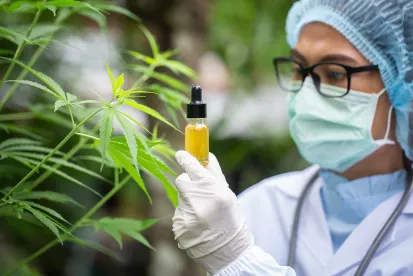Delta-8-tetrahydrocannabinol (Δ8-THC) is legal under federal law. Or is it? It depends on who you ask.
The Ninth Circuit has now weighed in on the issue, following the lead of several states, to conclude that Δ8-THC products are federally legal under the Agriculture Improvement Act of 2018 (the 2018 Farm Bill). But the Ninth Circuit also went a step further, holding that such products are also eligible for trademark protection. Before Δ8-THC companies start popping the champagne, it is worth noting that the United States Patent and Trademark Office (USPTO) and the Drug Enforcement Administration (DEA) have taken a different, dimmer view of such products, and the USPTO has previously denied several applications for Δ8-THC products on the basis that they are illegal under federal law. Before we dive into the conflicting authorities and the implications of this decision, we’ll discuss some of the background and confusion surrounding Δ8-THC.
What is Δ8-THC?
For those unfamiliar with Δ8-THC, it is a close cousin of delta-9-tetrahydrocannabinol (Δ9-THC), which is the psychoactive substance associated with “marihuana” or “weed.” According to the Food and Drug Administration, Δ8-THC also causes psychoactive and intoxicating effects, similar to Δ9-THC. Many in the industry, including the Centers for Disease Control and Prevention, have referred to Δ8-THC as “weed light” or “diet weed.”
The Controlled Substances Act bans the sale of “marihuana,” which is defined as anything containing a Δ9-THC concentration of more than 0.3% by dry weight. The 2018 Farm Bill legalized any derivatives, extracts, cannabinoids, etc. of the plant Cannabis sativa L (from which both Δ8-THC and Δ9-THC are derived).
One Text, Two Sets of Interpretations
Naturally, everyone disagrees about whether Δ8-THC is now legal as a result of the 2018 Farm Bill. There are cases pending in several states regarding the legality of Δ8-THC under the 2018 Farm Bill, and courts in several states — including Texas and Kentucky — and now the Ninth Circuit Court of Appeals have upheld injunctions on the basis that Δ8-THC is legal under the 2018 Farm Bill.
Notably, the DEA issued interim guidance in August 2020 stating that the 2018 Farm Bill did not legalize any “synthetically derived tetrahydrocannabinols,” which remain Schedule I controlled substances under federal law (according to the DEA). There has been much debate about whether and to what extent Δ8-THC can be derived other than “synthetically” from the Cannabis sativa L plant, but the consensus seems to be that Δ8-THC cannot be extracted naturally in sufficient amounts in a cost-effective manner without the use of a chemical reaction. The term “synthetically derived” remains ambiguous, as that term is not defined by either the DEA interim rule or the 2018 Farm Bill with regards to tetrahydrocannabinols. It is also an open question whether the DEA’s interim rule would survive a legal challenge given that it appears to contradict the plain terms of both the Controlled Substances Act and the 2018 Farm Bill.
And as we’ve previously covered, the USPTO has similarly taken the position that Δ8-THC is illegal under federal law. The USPTO has now issued non-final office actions in response to at least 11 of the approximately 50 applications involving Δ8-THC. In each case, the USPTO refused to register those marks after concluding that the products are illegal under the Controlled Substances Act, and finding the “exception” in the 2018 Farm Bill does not apply. While applicants thus far have elected to amend their applications to remove Δ8-THC or abandon their applications, this dichotomy will create an interesting standoff when any such denials are inevitably appealed to the Trademark Trial and Appeal Board (TTAB) and possibly the U.S. Court of Appeals for the Federal Circuit.
And as discussed below, the Ninth Circuit is the first federal appeals court to weigh in, recently upholding a preliminary injunction in a published opinion on the basis that “[p]lain statutory text [of the 2018 Farm Bill] compels the conclusion that AK Futures’ [Δ8-THC] products are lawful.”
The Ninth Circuit Weighs In
In AK Futures LLC v. Boyd St. Distro, LLC, 35 F.4th 682 (9th Cir. 2022), the plaintiff alleged that the defendant was selling counterfeit versions of its “Cake” brand e-cigarette and vaping products containing Δ8-THC. The plaintiff owns six trademark applications for Cake-related marks for use in connection with e-cigarette liquid, cartridges, and delivery systems, some of which are currently suspended based on a likelihood of confusion with other applications and none of which directly reference Δ8-THC products.
The district court granted a preliminary injunction in the plaintiff’s favor, finding that the 2018 Farm Bill legalized the plaintiff’s Δ8-THC products. In the Ninth Circuit, the defendant did not contest the finding it was selling counterfeit products; instead, it argued that the plaintiff could not own a valid trademark in connection with these products because federal law forbids the possession and sale of Δ8-THC products.
The Ninth Circuit found that the plaintiff was likely to succeed on the merits of its trademark claim “because its delta-8 THC products are not prohibited by federal law, and they may therefore support a valid trademark.” In so doing, the Ninth Circuit pointed to the plain text of the 2018 Farm Bill and found the Δ8-THC in the plaintiff’s products “appear[] to fit comfortably within the statutory definition of ‘hemp.’”
The defendant raised a number of counter arguments that the Ninth Circuit rejected. Of note, the defendant pointed to agency interpretation, but the Ninth Circuit found that the 2018 Farm Bill’s definition of “hemp” was not ambiguous, so it need not consider agency interpretation. Relatedly, the defendant argued this conclusion was against congressional intent, but the Ninth Circuit found it is for Congress to fix that mistake if it created a loophole. In the end, the Ninth Circuit concluded that the plaintiff’s “[Δ8]-THC products are lawful under the plain text of the Farm Act and may receive trademark protection.”
So, What Now?
It remains to be seen whether, and to what extent, the DEA would even attempt to enforce the interim rule. When asked about enforcement action against Δ8-THC providers, a DEA spokesman indicated that they were focusing their enforcement priorities on more pressing concerns, such as the opioid epidemic and the cartel presence in the United States.
It is worth noting that the Ninth Circuit’s decision will constitute only persuasive precedent for the TTAB and the U.S. Court of Appeals for the Federal Circuit in reviewing appeals of USPTO trademark denials. To date, it appears no applicant has moved past the non-final office action stage. Should an applicant be met with a final rejection of an application, this Ninth Circuit opinion may be worth raising, but it is probably not going to move the needle too far. Still, it is possible the Ninth Circuit’s opinion is the first circuit-level domino to fall and lead to a host of persuasive federal court opinions sufficient to change the USPTO’s opinion on the legality of Δ8-THC products.




 />i
/>i

